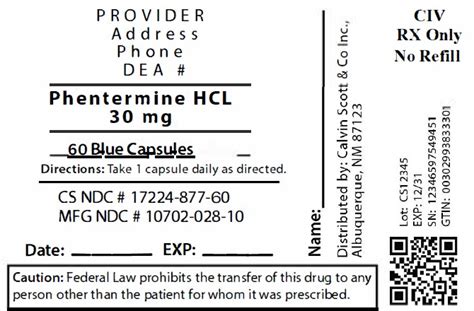Intro
Discover the safety of Phentermine, a weight loss medication, and learn about its potential side effects, interactions, and long-term risks, to make an informed decision about its use for effective and healthy weight management.
Phentermine is a prescription medication that has been used for decades to help individuals lose weight. It is a stimulant that works by suppressing appetite and increasing energy levels, making it easier for people to stick to a diet and exercise plan. However, as with any medication, there are potential risks and side effects associated with phentermine. In this article, we will delve into the safety of phentermine, its benefits, and its potential drawbacks.
Phentermine has been shown to be effective in helping people lose weight, particularly when combined with a healthy diet and regular exercise. It works by stimulating the brain to release certain chemicals that help to reduce hunger and increase feelings of fullness. This can lead to significant weight loss, especially in individuals who have struggled with obesity and related health issues. However, it is essential to use phentermine under the guidance of a healthcare professional, as they can help to monitor any potential side effects and ensure that the medication is used safely.
The safety of phentermine has been a topic of debate in recent years, with some studies suggesting that it may be associated with an increased risk of heart problems and other cardiovascular issues. However, other research has found that phentermine can be safe when used as directed and under the supervision of a healthcare professional. It is crucial to weigh the potential benefits and risks of phentermine and to discuss any concerns with a doctor before starting treatment.
Benefits of Phentermine

How Phentermine Works
Phentermine works by stimulating the brain to release certain chemicals that help to reduce hunger and increase feelings of fullness. This can lead to significant weight loss, especially in individuals who have struggled with obesity and related health issues. Phentermine also increases energy levels, making it easier to stick to a diet and exercise plan.Risks and Side Effects of Phentermine

Common Side Effects of Phentermine
The most common side effects of phentermine are mild and temporary, and they may include: * Headaches * Dizziness and lightheadedness * Nausea and vomiting * Diarrhea and other gastrointestinal issues * Fatigue and weaknessLong-Term Effects of Phentermine

Phentermine and Cardiovascular Health
Phentermine may be associated with an increased risk of heart problems and other cardiovascular issues, particularly when used in combination with other medications or in individuals with pre-existing heart conditions. It is crucial to discuss any concerns with a healthcare professional and to carefully monitor cardiovascular health while using phentermine.Phentermine Alternatives

Natural Weight Loss Strategies
There are several natural weight loss strategies that can be effective, including: * Eating a healthy and balanced diet * Getting regular exercise * Reducing stress and improving sleep * Staying hydrated and limiting calorie intakePhentermine and Pregnancy

Phentermine and Breastfeeding
Phentermine is not recommended for use during breastfeeding, as it may be associated with an increased risk of side effects in infants. It is essential to discuss any concerns with a healthcare professional and to carefully weigh the potential benefits and risks of phentermine.Phentermine Dosage and Administration

Phentermine Interactions
Phentermine may interact with other medications, including: * Antidepressants * Blood thinners * Diabetes medications * High blood pressure medicationsPhentermine Warnings and Precautions

Phentermine Contraindications
Phentermine is contraindicated in individuals with certain medical conditions, including: * Heart disease * High blood pressure * Glaucoma * HyperthyroidismIs phentermine safe for long-term use?
+Phentermine is generally not recommended for long-term use, as it may be associated with an increased risk of side effects and other complications. It is essential to discuss any concerns with a healthcare professional and to carefully weigh the potential benefits and risks of phentermine.
Can phentermine be used during pregnancy or breastfeeding?
+Phentermine is not recommended for use during pregnancy or breastfeeding, as it may be associated with an increased risk of side effects and other complications. It is essential to discuss any concerns with a healthcare professional and to carefully weigh the potential benefits and risks of phentermine.
What are the potential side effects of phentermine?
+The potential side effects of phentermine include increased heart rate and blood pressure, insomnia and other sleep problems, dry mouth and unpleasant taste, constipation and other gastrointestinal issues, and anxiety and irritability. It is essential to discuss any concerns with a healthcare professional and to carefully monitor any side effects or concerns.
In conclusion, phentermine can be a safe and effective weight loss medication when used under the guidance of a healthcare professional. However, it is essential to carefully weigh the potential benefits and risks of phentermine and to discuss any concerns with a doctor before starting treatment. By understanding the benefits, risks, and side effects of phentermine, individuals can make informed decisions about their weight loss journey and achieve their goals in a healthy and sustainable way. We invite you to share your thoughts and experiences with phentermine in the comments section below, and to explore other resources and articles on our website for more information on weight loss and overall health.
